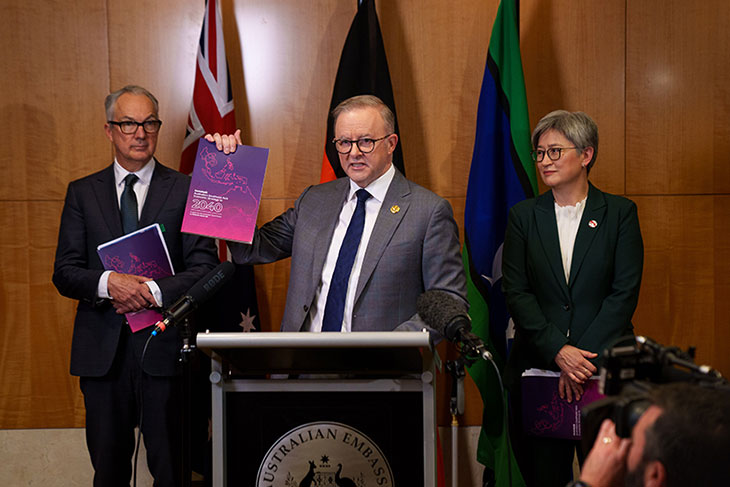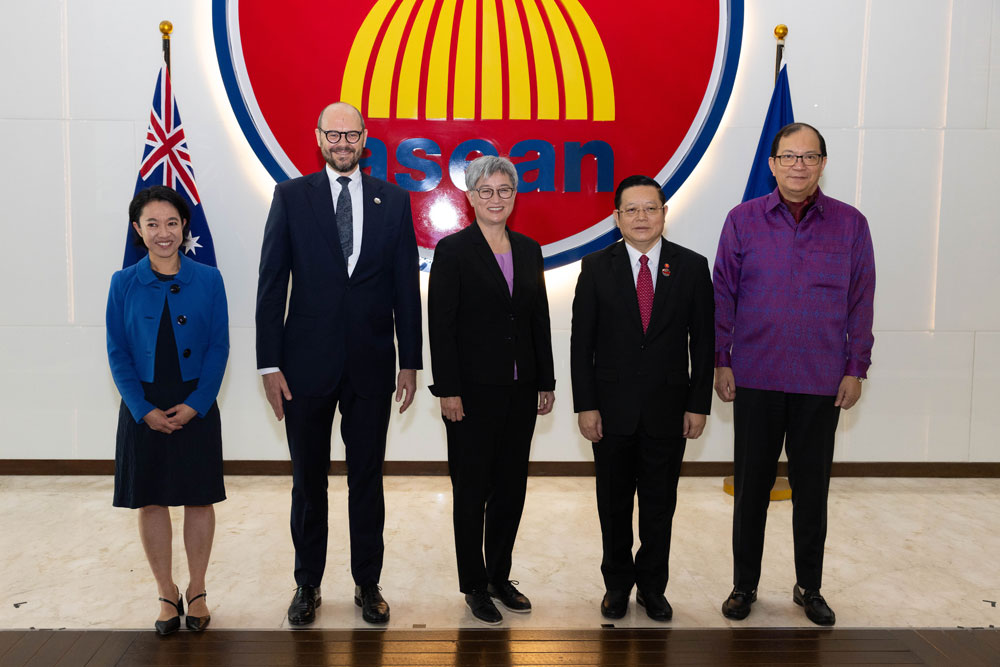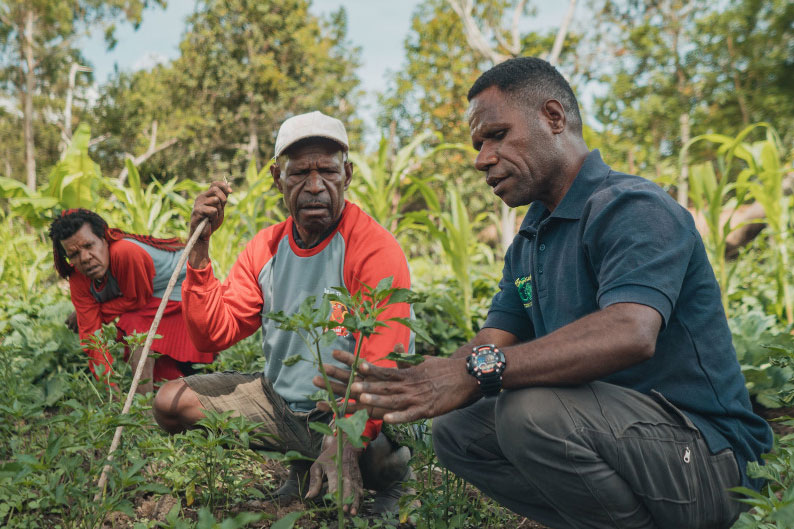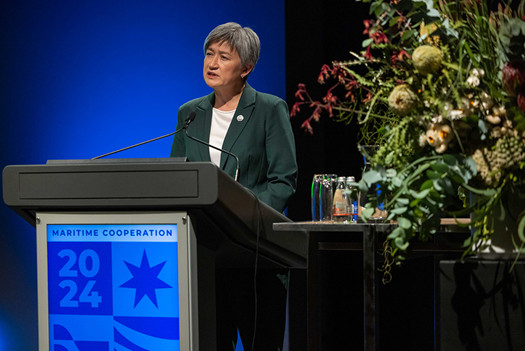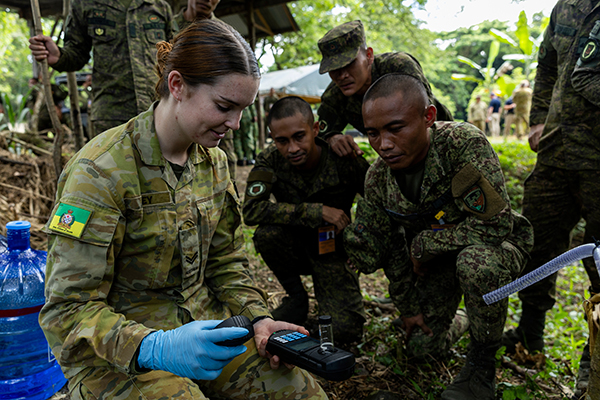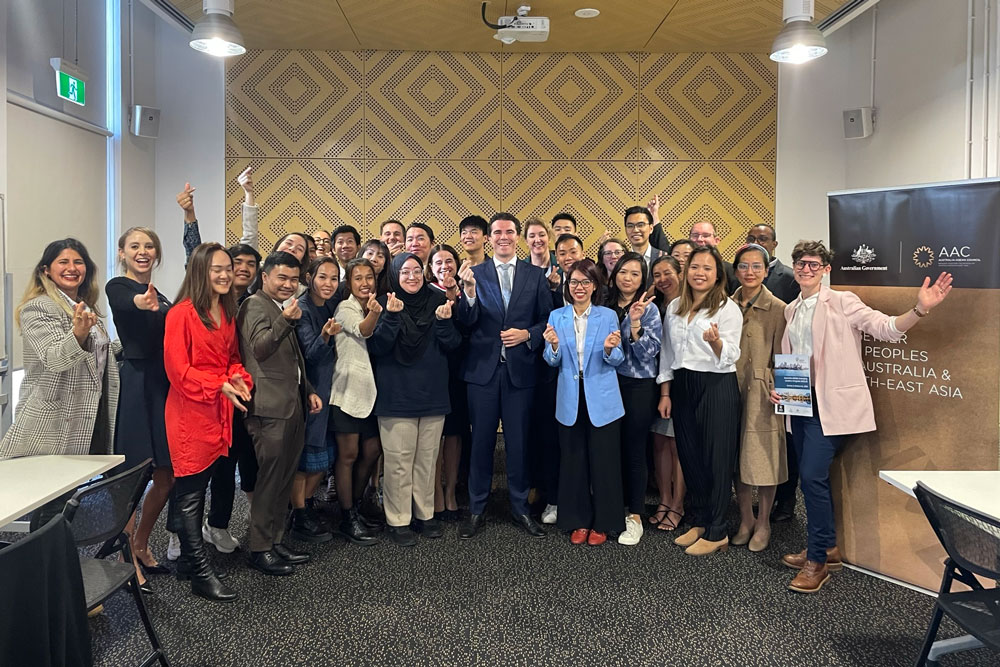Southeast Asia is central to Australia’s national interests and our partnerships are deep and long‑standing. Australia’s security, prosperity, and economic future are linked to Southeast Asia. Our connections to the region go beyond geography, with enduring family, business, education and tourism ties. We share a vision for a region that is peaceful, stable and prosperous, where sovereignty is respected and international law is upheld.
Deepening Australia’s engagement with Southeast Asia is a priority for the Australian Government. The Office of Southeast Asia in the Department of Foreign Affairs and Trade leads our whole-of-nation approach with the region.
Deepening Australia's engagement with Southeast Asia
On this page
Trade and investment
Australia and Southeast Asia's trade interests are inextricably linked. Australia's two-way trade with Association of Southeast Asian Nations (ASEAN) is greater than our trade with Japan or the United States, passing $183.7 billion in 2023, and our two-way stock of total investment with ASEAN in 2023 was $282 billion. Singapore, Malaysia, Thailand, Indonesia and Vietnam were also in our top 15 trading partners for 2023. In any match-up of economic complementarity with growth potential, the greatest trade and economic opportunities for Australia over the next 30 years lie in Southeast Asia.
On 6 September 2023, Prime Minister Anthony Albanese launched Invested: Australia's Southeast Asia Economic Strategy to 2040, a report to the Australian Government from Special Envoy for Southeast Asia Mr Nicholas Moore AO sets out a practical pathway to significantly increase two-way trade and investment between Australia and Southeast Asia. The Australian Government is taking action to advance Invested, including through new and expanded initiatives to implement its recommendations. These initiatives are helping Australian and Southeast Asian businesses and investors connect and explore the vast opportunities on offer.
- Implementing Invested: Australia’s Southeast Asia Economic Strategy to 2040
- ASEAN-Australia Special Summit Outcomes Summary
- Department of the Prime Minister and Cabinet: 2024 ASEAN-Australia Special Summit
- Department of Foreign Affairs and Trade: ASEAN and Australia
The ASEAN-Australia Comprehensive Strategic Partnership (CSP) is an important symbol of our commitment to ASEAN and its central role in the Indo-Pacific. Australia’s investments under the CSP represent the largest ever increase in Australia’s development cooperation program with ASEAN.
Australia was an original party to the Regional Comprehensive Economic Partnership (RCEP) Agreement when it entered into force on 1 January 2022. RCEP reinforces ASEAN's centrality within the Indo-Pacific regional economic architecture and rules-based order and brings together Australia, New Zealand, ASEAN and the major North Asian economies of China, Japan and South Korea. RCEP is now the world’s largest free trade agreement by members’ combined gross domestic product (GDP).
On 21 August 2023, Australia signed the Second Protocol upgrading the ASEAN Australia-New Zealand Free Trade Agreement (AANZFTA). The AANZFTA Upgrade is a historic step towards deeper regional economic integration and provides both economic and strategic advantages to Australia. The Regional Trade for Development Initiative (RT4D) provides technical assistance and capacity building to support ASEAN countries to realise the full benefits of RCEP and an upgraded AANZFTA.
We work closely with our bilateral partners and neighbours to provide mutually beneficial economic opportunities, including through the:
- Australia-Vietnam Enhanced Economic Engagement Strategy
- Australia‑Singapore Digital Economy Agreement
- Indonesia-Australia Comprehensive Economic Partnership Agreement (IA-CEPA).
We are also helping to advance high-quality development across Southeast Asia through Partnerships for Infrastructure (P4I), and economic integration in the Mekong-Australia Partnership.
Development cooperation
Australia’s new International Development Policy outlines how Australia will support Southeast Asia in our shared development priorities. In 2025–26, Australia is directing our $1.28 billion development program in Southeast Asia to meet the highest needs.
Australia’s development cooperation in Cambodia, Indonesia, Laos, Myanmar, Philippines, Timor-Leste and Vietnam tackles some of our region’s most pressing priorities – including climate change, inclusive and sustainable growth, health security, and resilient communities.
Australia’s regional and multi-country partnerships and programs tackle shared challenges across Southeast Asia. We work closely with ASEAN and the Mekong subregion to pursue a region that is peaceful, stable and prosperous.
Our approach to regional development cooperation is outlined in the Southeast Asia Regional Development Partnership Plan.
Climate action and transition to net zero
Australia is ambitious for what we can achieve together with the region in confronting the challenges of climate change.
We are supporting enhanced climate action in Southeast Asia to accelerate the region’s energy transition. We want to realise the economic opportunities for countries in our region in our transition to a net zero world. Our commitments include the $200 million Australia-Indonesia Climate and Infrastructure Partnership, $90 million Australia-Vietnam Partnership for Economic Growth and $222.5 million Mekong-Australia Partnership. We are supporting development of the ASEAN Strategy on Carbon Neutrality by the ASEAN Secretariat.
Australia is working with our partners in the region to build a resilient and lean energy sector and unlock green trade and investment. For example, the landmark Singapore-Australia Green Economy Agreement supports Australia's economic, trade, investment, and climate change objectives while building on our substantial bilateral relationship with Singapore.
Gender equality and disability inclusion
Australia is committed to working with ASEAN and partners across the region including partner governments, private sector and civil society to tackle the structural barriers that prevent gender equality and realisation of the rights of people with disabilities.
Investing in Women (2023-2027; up to $80 million) is accelerating women’s economic equality in Southeast Asia, through increased and equitable opportunities in the private sector. Australia is collaborating with regional partners on the $20 million Southeast Asia Gender-Based Violence (GBV) Prevention Platform (2024-2029). The Platform brings together partner governments, civil society, and regional and international organisations to build locally-led capacity, evidence and practice to prevent GBV in all its forms.
In Southeast Asia, in line with Australia’s International Disability Equity and Rights Strategy, we continue our proud legacy of support for the rights of people with disability. The need for effective and accountable action on disability equity is more crucial than ever. Examples of our partnerships in the region include the Basic Education Quality and Access in Lao PDR program, which supports the Lao Ministry of Education to promote disability equity and rights through the new primary school curriculum.
Through the Stronger Movements, Stronger Futures initiative, Australia will increase support for organisations of people with disability (OPDs) across the Indo-Pacific and encourage them to engage in regional and international processes. The investment will strengthen collaboration and dialogue between global, regional, and local partners, create new spaces for learning, and share innovative solutions and good practice. It will support OPD leaders to influence and shape regional and global forums.
Australia’s Southeast Asia Maritime Partnerships
Australia is investing $64 million over four years (2024-2028) to enhance our Southeast Asia Maritime Partnerships. This will expand Australia's maritime cooperation with regional partners and contribute to our interests in a peaceful, stable and prosperous region, consistent with the priorities of Southeast Asian countries. Australia is supporting government and institutional cooperation through practical maritime activities to help address shared challenges and uphold international law, particularly the 1982 UN Convention on the Law of the Sea.
The Partnerships will support practical maritime activities including skills development, training and technology transfer. For example, conserving coral reefs through the Australian Institute of Marine Science, maritime law enforcement and domain awareness through the Australian Border Force, geospatial mapping through Geoscience Australia, marine environmental governance through the Australian Centre for International Agricultural Research, and marine protection through the Department of Climate Change, Energy, the Environment and Water.
In addition, we continue a range of initiatives to support countries to manage their maritime domains and marine environments and uphold the law of the sea, including through:
- The $14.4 million Combatting Illegal Fishing and Promoting Sustainable Fisheries in SEA program delivered by the Australian Department of Agriculture, Fisheries and Forestry
- Building capacity in maritime law, governance and coordination through partnerships with the Australian National Centre for Ocean Resources and Security (ANCORS) at the University of Wollongong, including:
- establishing the ANCORS Southeast Asia Maritime Institute
- law of the sea training
- the Southeast Asian Women in Maritime Security Network
- maritime security scholarships for Master’s and PhD candidates
- Fostering regional academic research on maritime policy issues through the $2.4 million Blue Security initiative, a consortium of Australian universities.
Cyber and critical tech cooperation
Under the 2023-2030 Australian Cyber Security Strategy, the Australian Government is committed to providing targeted, impactful and sustainable capacity building initiatives for enduring cyber resilience in the Indo-Pacific and ensuring Australia is the partner of choice in the region.
Since 2016, over $40 million has been invested in Southeast Asia through the Southeast Asia and Pacific Cyber Program (SEA-PAC Cyber), and its predecessor Cyber and Critical Tech Cooperation Program (CCTCP), supporting more than 80 regional and country-specific projects across nine countries.
SEA-PAC Cyber supports a cyber resilient region through:
- enhancing cyber security and critical technology capabilities
- strengthening cyber incident preparedness and response
- supporting development of national and regional cyber policies, norms, standards, laws and regulations to reflect an open, free and secure cyber ecosystem.
Defence engagement
Australia has broad, deep and longstanding defence partnerships across Southeast Asia, and we continue to strengthen our military ties with the region. Australia has Defence Attachés or Advisers in all ASEAN Member States, reflecting our commitment to regional security and cooperation. Each year, Defence participates in around 50 exercises with Southeast Asian partners and makes about 1,000 offers for military officers from ASEAN Member States to study and train in Australia.
Defence cooperation continues to expand across key areas such as maritime security, peacekeeping, military medicine and English language training. Each year, the Australian Defence Force (ADF) participates in approximately 50 bilateral and multilateral exercises with Southeast Asian partners. Australia also offers a range of training opportunities annually for military officers from ASEAN Member States to study in Australia. Australia’s flagship regional engagement activity, Indo-Pacific Endeavour, visits multiple countries across the region each year.
The Five Power Defence Arrangements (FPDA) – comprising Australia, Malaysia, New Zealand, Singapore, and the United Kingdom – have provided an indispensable anchor for regional security for over 50 years. The FPDA strengthens cooperation, and makes it easier for our militaries to work together when it counts.
Australia is also a strong supporter of the ASEAN Defence Ministers’ Meeting Plus (ADMM-Plus) framework, which promotes open dialogue and practical defence cooperation. Australia actively participates in all seven ADMM-Plus Experts’ Working Groups (EWGs), and is currently co-chairing the EWG on Cyber Security with Cambodia for the 2024–2027 cycle.
Credit: LACW Emma Schewnke
Health partnerships
Australia is helping to build resilient and equitable health systems in Southeast Asia. Through the Partnerships for a Healthy Region initiative, we are supporting countries in the region to reduce disease risks and burdens, and respond effectively to health emergencies. This continued investment in health is an important contribution to Southeast Asia’s recovery from the pandemic and builds on the COVID-19 vaccine support provided under the Regional Vaccine Access and Health Security Initiative and Quad Vaccine Partnership.
People connections
More than one million Australians claim Southeast Asian ancestry. We foster close ties with the people of Southeast Asia through the New Colombo Plan, Australia Awards, Aus4ASEAN scholarships, and Australian Volunteers Program, and support a range of public diplomacy initiatives in the region.
Our people and institutional connections with Southeast Asia are also further enhanced through the ASEAN-Australia Centre (AAC) and Australia-Indonesia Institute.

